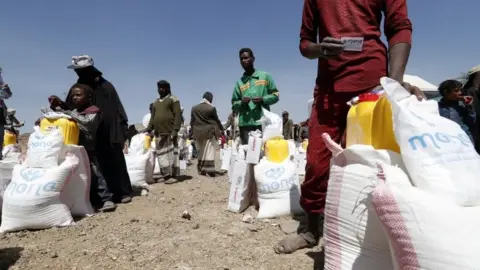Yemen conflict: UK defends Yemeni aid cuts amid criticism from MPs
 EPA
EPAThe UK government has defended its decision to slash humanitarian aid to Yemen, saying it would continue to "do its bit" to support the most vulnerable in the war-torn country.
The UK will give "at least" £87m this year, down from £164m in 2019-2020.
Foreign Secretary Dominic Raab said UK support would feed 240,000 children and supply clean water for millions.
But one ex-minister said the move was "unconscionable" given Yemen's plight and "not who we are" as a country.
The decade-long conflict in Yemen has left an estimated 20 million people - two-thirds of the population - dependent on humanitarian assistance while two million children are acutely malnourished.
The situation has been called the world's worst humanitarian crisis.
The UK gave £214m in humanitarian aid to Yemen in total in 2020-2021. This included £164m pledged at a UN-backed international conference last year, as well as £50m of additional spending.
It is now proposing a total reduction after announcing a sharp fall in pledged funding for 2021-2022 at the same UN donors' event on Monday.
The decision follows the UK's decision to reduce its overall international aid budget by about £4bn in 2021-2022, which in the process will see it miss the UN target of spending 0.7% of national income on foreign aid.
The government has said pressure on the public finances from the pandemic means tough choices are required.
'Difficult circumstances'
Defending the move in Parliament, ministers said the UK could be "proud" of its humanitarian record in Yemen, having given £1bn since the conflict began.
"We're doing our bit," Mr Raab said. "Of course these are very difficult financial circumstances. We remain, as we have done over the last five years, between the third and fifth highest donor into Yemen."
The latest £87m pledge would, he explained, "feed an additional 240,000 of the most vulnerable Yemenis each month, it will support 400 health clinics and provide clean water for 1.6 million people".
In addition, a further £1.5 million will be provided to enable the poorest families to buy food and other essential provisions.
But Labour's shadow international development secretary Preet Kaur Gill condemned the move.
"The British people have a proud history of stepping up and supporting those in needs, but the actions of the government yesterday betrayed hundreds of thousands of Yemeni children as he chose to leave them to starve."
And former Conservative international development secretary Andrew Mitchell said the move was "unconscionable" given the desperate situation in Yemen.
"The fifth richest country in the world is cutting support by more than half to one of the poorest countries in the world during a global pandemic," he said.
'Harbinger'
He also warned it was a "harbinger of terrible cuts to come" to support for other countries.
"Everyone in this House knows the cut to 0.7% is not a result of tough choices but is a strategic mistake with deadly consequences. This is not who we are."
The Yemen conflict began in late 2014, when rebels seized control of much of the west of the country and a Saudi-led coalition of Arab states launched a military operation to restore President Abdrabbuh Mansour Hadi's rule.
In addition to conflict, Yemen has seen a collapse of its health system, leaving it incapable of coping with the coronavirus pandemic.
Speaking at Monday's event, UN officials warned that if the UN failed to meet its $3.85bn target for 2021, millions of Yemenis could face starvation. It is unclear how much has been raised so far.
Mr Gurerres said that generous donations had averted a famine in 2018, but that "today, reducing aid is a death sentence". The US pledged an extra $191m at the event - bringing its total aid for Yemen to $350m this year.
